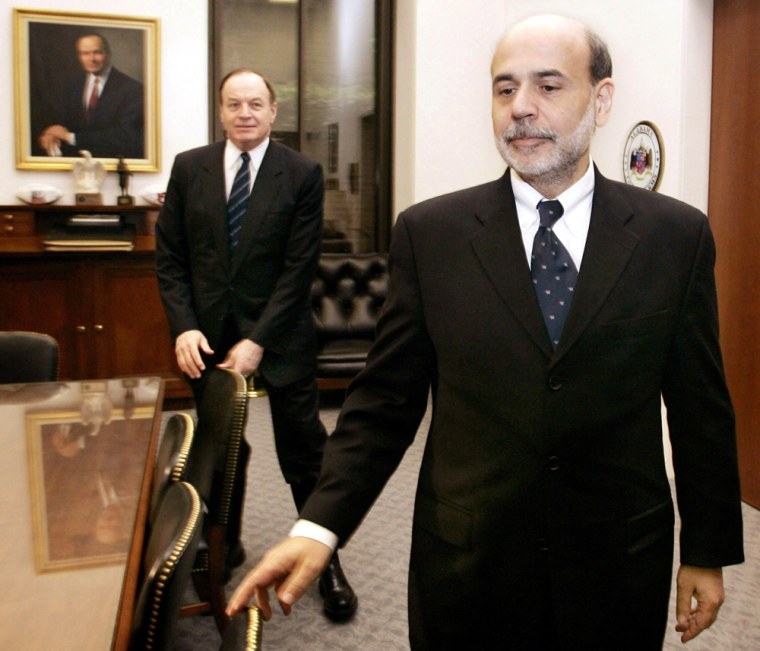The glow faded quickly, but President Bush did enjoy at least one bright spot in one of the worst weeks of his presidency.
Bush’s nomination of economist Ben Bernanke to take on the mantle of Federal Reserve chairman from the retiring Alan Greenspan was welcomed by investors, market analysts and even many of his usual critics.
The stock market rallied sharply after Bush’s announcement Monday. That helped propel the market to a strong advance for the week despite the indictment of vice presidential aide “Scooter” Libby, as the Dow Jones industrial average gained 173 points on strong economic news.
The editorial pages of The New York Times and The Wall Street Journal rarely agree on anything, but on this choice they were in harmony. The Times called the selection a “as close to the perfect choice as Mr. Bush could have made.” The Journal was a bit more reserved but praised the former Princeton professor as an “ardent free trader” who favors making Bush’s tax cuts permanent.
Economists say the nomination of Bernanke has made little difference to their forecasts of what the Fed will do to interest rates next year, although some think the new Fed chief might be more likely to act aggressively to snuff inflation than Greenspan would have.
Greenspan chairs one of his final policy-setting meetings Tuesday and appears to be on a glide path to leave monetary policy at a level that at least some analysts describe as almost perfectly neutral.
The Fed almost certainly will raise the benchmark overnight bank lending rate a quarter-point Tuesday, as it has done at every meeting of policy-makers since June 2004. And analysts generally expect the Fed to boost rates again at Greenspan’s final two meetings Dec. 13 and Jan. 31, making at 14 quarter-point rate hikes over 20 months.
And on the final day of his 18 years in the godlike job of steering the world’s largest economy, Greenspan will see that it is good, and he will rest from all the work that he has done. Even as inflation creeps upward, analysts say Greenspan is positioned to leave his successor a clean slate by removing the “measured” language from the Fed’s policy statement that has unerringly signaled the steady stream of quarter-point rate hikes.
“I think the script has it that they tighten three more times and the measured policy statement is history -– that would put monetary policy right at neutral,” said Mark Zandi, chief economist of Economy.com. He described it as a “storybook ending” that would allow him to leave with core inflation at 2 percent, unemployment at 5 percent, the economy growing at its long-term average of 3.5 percent and monetary policy at least arguably neutral.
Kurt Karl, chief economist for Swiss Re, agrees that the final act of the Greenspan Fed early next year is likely to be removing the “measured pace” language from the policy statement. By then the overnight rate will be at 4.5 percent -– compared with 1 percent in mid-2004 -– and the central bank likely will want the flexibility to move rates higher, lower or leave them unchanged depending on whether inflation or slow growth appears to be the bigger threat.
While the rate increases have been gradual, they also are beginning to bite. Long-term mortgage rates have risen steadily over the past two months, with the average 30-year mortgage at 6.15 percent, compared with 5.71 percent in early September. By this time next year, mortgage rates could be close to 7 percent, many analysts believe.
This is not high by historical standards, but already it looks like it should be enough to skim what Greenspan has called the “froth” from the housing market. New-home inventories reached a record 493,000 in September and the median sales price fell 5.7 percent, according to a report this week.
And mortgage applications fell 8 percent to their lowest level since April, the Mortgage Bankers Association said.
“I do think we are either at a plateau or a crest,” said Frank Nothaft, chief economist of Freddie Mac, the mortgage giant. This year will clearly be a record for home sales and construction with level likely to drop in 2006, he said.
“As mortgage rates go higher that will work to reduce housing demand,” he said. Almost equally important, mortgage refinancing, which has injected an estimated $200 billion in home-equity cash into the economy this year, is likely to tail off significantly next year.
While Bernanke’s elevation to Fed chief might not change the policy outlook substantially, it certainly will mark a distinct change of tone from the often purposefully inscrutable Greenspan.
In his nearly three years as a Fed governor Bernanke pushed for greater “transparency” at the Fed, resulting in changes such as disclosing how policy-makers voted immediately after the conclusion of their meetings.
Bernanke’s belief in clarity also extends to his speaking style, which tends to be far more straightforward than Greenspan’s. In his four months as chairman of Bush’s Council of Economic Advisers, Bernanke avoided making waves, no doubt mindful of the missteps of some of Bush’s previous economic aids.
Fred Barnes, executive editor of the weekly standard, described Bernanke’s White House tenure as “one of the longest job interviews in history.”
But as a Fed governor from 2002 until this year, Bernanke was known to push the envelope in his speeches, floating ideas with a frankness that should prove refreshing after the sometimes turgid rhetoric of the Greenspan years.
His November 2002 speech on deflation was a model of clarity. He said the chance of a widespread drop in prices was “extremely small” but so potentially dangerous that it was crucial to study ways to fight the possibility. In the spring of this year he proposed that a “global savings glut” is partly responsible for the nation’s current account deficit, which he described as the “tail of the dog” in an closely interconnected global economy.
